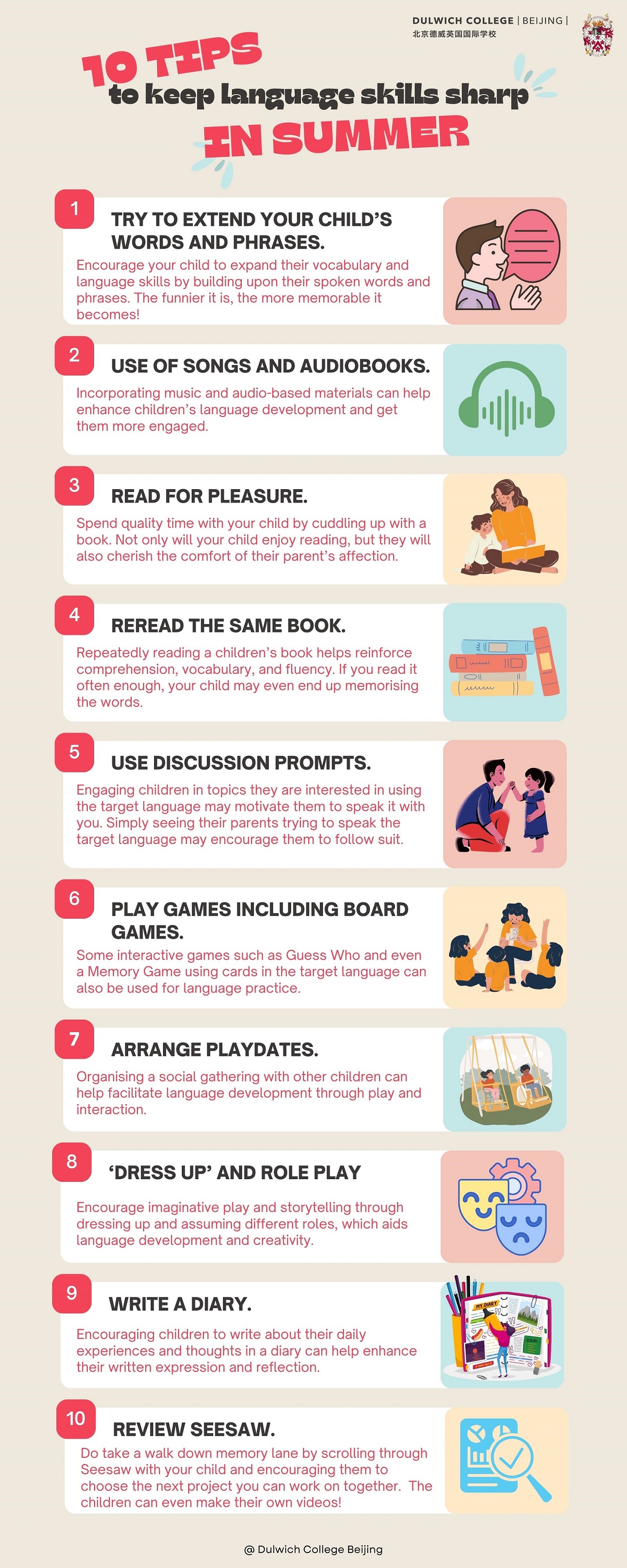10 Language Hacks to Keep Skills Sharp During Summer Break
For families studying in a multilingual school, one of the unique challenges of an extended break such as the summer holiday is a possible decline in practise or use of a child’s foreign or second language skills.
Practising a foreign language, especially when there’s no genuine reason or a confident speaker to practise it with, is a challenge for any individual at any age, let alone a young child. Add to this the freedom from academic expectations that one comes to expect during an extended break which may make children resistant to studying. So try this alternative instead; use this “study time” as an opportunity to bond.
Emily Laws, DUCKS’ EAL (English as an Additional Language) Coordinator, explains that the best way to motivate children to learn is for parents to be good role models themselves and by showing interest in their child’s learning and development. “Parents are the main influence in their children’s lives, so being involved and interested in their children’s learning and development can help build firm foundations. By demonstrating to our young children how they as parents would read and learn languages, parents not only serve as good role models but also encourage children to foster independence and build social and emotional skills such as resilience and confidence.”
During the school year, our DUCKS team regularly organises Parent Academies to share more about our teaching pedagogy and provide suggestions to our parents. Here are some tips that have been shared during those sessions to help students keep their second language skills sharp this summer and have fun at it:

- Try to extend your child’s words and phrases. Encourage your child to expand their vocabulary and language skills by building upon their spoken words and phrases. The funnier it is, the more memorable it becomes! Don’t worry too much about their mistakes; the goal is to build your child’s confidence.
- Use of songs and audiobooks. Incorporating music and audio-based materials can help enhance children’s language development and get them more engaged. Supplement songs with a dance or audiobooks with some actions to help young children be even better engaged. For your more artistic children, encourage them to draw illustrations as they listen to the stories or audiobooks.
- Read for pleasure. Use this as an opportunity to spend quality time with your child by cuddling up with a book. Not only will your child enjoy reading, but they will also cherish the comfort of their parent’s affection.
- Reread the same book. Repeatedly reading a children’s book helps reinforce comprehension, vocabulary, and fluency. If you read it often enough, your child may even end up memorising the words. You can also encourage them to tell whole stories using story maps, or pictures and symbols with arrows.
- Use discussion prompts. Engaging children in topics they are interested in using the target language may motivate them to speak it with you. If your child does not respond in the target language, don’t worry; simply seeing their parents trying to speak the target language may encourage them to follow suit. If you throw in a few very obviously incorrect words, your child may even try to correct you and say the sentences themselves!
- Play games including board games. Who doesn’t love a good game? Some interactive games such as Guess Who and even a memory game using cards in the target language can also be used for language practice. Shared Ms Laws, “The social conventions of turn-taking and eye contact can be practised in a more natural way through playing games. Here at DCB, we often play games to start lessons to help children feel at ease and confident to join in.”
- Arrange playdates. Organising a social gathering with other children can help facilitate language development through play and interaction.
- Play ‘dress up’ and role play. Encourage imaginative play and storytelling through dressing up and assuming different roles. This can help aid in language development and creativity.
- Write a diary. Encouraging children to write about their daily experiences and thoughts in a diary can help enhance their written expression and reflection. According to Ms Laws, recounting what they have done is one of the easiest and most accessible genres for children. For older learners, this is a natural opportunity to see which past tense verbs they can recall.
- Review Seesaw, the Home Learning projects and Unit of Investigation newsletters. Looking for more ideas on what to do? Do take a walk down memory lane by scrolling through your child's Seesaw with your child and encouraging them to choose the next project you can work on together. For our DUCKS families, do review our Word and Phrase of the Week videos in our Home Learning projects prepared by our EAL team. The children can choose a word or phrase to do with their holiday and then even make their own videos!
Enjoy the remainder of your summer holiday, and we look forward to seeing you all in the new school year!








